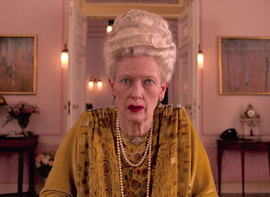By Cynthia Citron


LOS ANGELES —The Grand Budapest Hotel is a funny film. Not in the LOL sense, but more in the way of a smile of acknowledgment from time to time at the absurdities of the plot. It’s like an old Looney Tunes cartoon. Watch out for that cliff that you’re just about to fall off of!
Ralph Fiennes is M. Gustave H., the quintessential concierge at this lavish European hostelry. He is imperious with his staff, obsequious to his guests, and enticing to his cohort of elderly widows who come to him repeatedly for the wooing and the sex. Not surprisingly, many of them leave him chunks of their estates in gratitude for his unwavering charm and meticulous attention.
Among these is the extraordinarily wealthy Madame D., played by Tilda Swinton in some of the most ghastly makeup since Dorian Gray. She is virtually unrecognizable in her mountainous white hairdo and glassy eyes. She instigates the film’s action, however, by dying and leaving M. Gustave a priceless painting.
When Madame D.’s son Dmitri Desgoffe-und-Taxis (Adrien Brody, looking like Salvador Dali in a threatening black moustache) refuses to acknowledge the bequest, M. Gustave is reduced to stealing it off the wall from the family mansion.
M. Gustave is aided in this, and all the farcical adventures that follow, by his ardent apostle, Zero (Tony Revelori). You can recognize him by his tight purple uniform and by the fact that the words LOBBY BOY are embroidered in large gold letters on his cap.
For some inexplicable reason, the authorities decide Madame D. died under mysterious circumstances and that M. Gustave is her murderer. So, with the devoted Zero at his heels, M. Gustave leaves the hotel and begins a series of adventures that are nearly impossible to follow because they appear to be carefully calibrated non-sequiturs.
But not to worry. Even though the film sweeps back and forth between the 1930s and 1968, the abiding mood remains constant: a quirky romantic nostalgia for the decades between the wars. A mood that is only enhanced by the rich photography of the landscapes and the colorful houses and narrow cobblestone streets of the fictitious Republic of Zubrowka.
In a short expository film online, the story is told of the search throughout Eastern Europe for just the right hotel to represent the Grand Budapest Hotel. There were many lush hotels and castles in Germany, where the film was shot, but in the end the designers chose an empty department store that they refurbished and furnished from scratch. They constructed the rather seedy “modern” version of the hotel as it looked in 1968 and proceeded to shoot the end of the film first. Then they tore down that set and constructed the elegant lobby of the earlier years, replete with bright red carpets, gleaming woods, and spectacular chandeliers.
Wes Anderson, who directed, produced, and wrote the story and screenplay, acknowledges that the film was partially inspired by the works of the Austrian Jewish novelist, playwright, and biographer Stefan Zweig, most notably his novels Beware of Pity and The Post Office Girl.
For me, however, the most delightful elements in the film are the cameos by Anderson’s informal “repertory company” of friends. They pop up unexpectedly for brief moments, sometimes speak only a line or two, and disappear. In addition to Ralph Fiennes, Adrien Brody, and Tilda Swinton, they include Jude Law, Jeff Goldblum, Harvey Keitel, Willem Dafoe, Tom Wilkinson, Edward Norton, Jason Schwartzman, Owen Wilson, Bob Balaban, F. Murray Abraham, and Bill Murray. All of them have appeared in two or more of Anderson’s films, and Bill Murray has appeared in all of them.
At any rate, in making this film they all look like they’re having a helluva lot of fun. As Tilda Swinton has described it, “It was one huge rambling house party.”
The Grand Budapest Hotel opened on March 7th and is in general release now in Los Angeles.
*
Cynthia Citron is a freelance writer who specializes in movie and play reviews. She may be contacted at cynthia.citron@sdjewishworld.com San Diego Jewish World seeks sponsorships to be placed, as this notice is, just below articles that appear on our site. This is an ideal opportunity for your corporate message or to personally remember a loved one’s contributions to our community. To inquire, call editor Donald H. Harrison at (619) 265-0808 or contact him via donald.harrison@sdjewishworld.com
Stefan Zweig’s non-fiction, including his autobiography The World of Yesterday, is now available in eBook form from Plunkett Lake Press: Stefan Zweig eBooks
Joyce Camiel writes: terrific film…go see it!